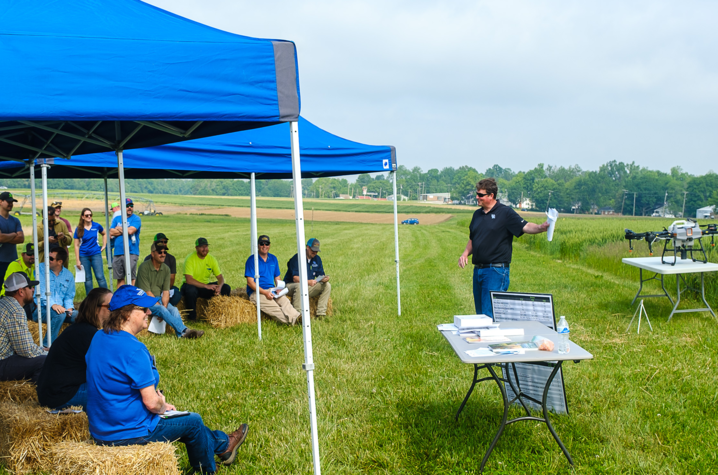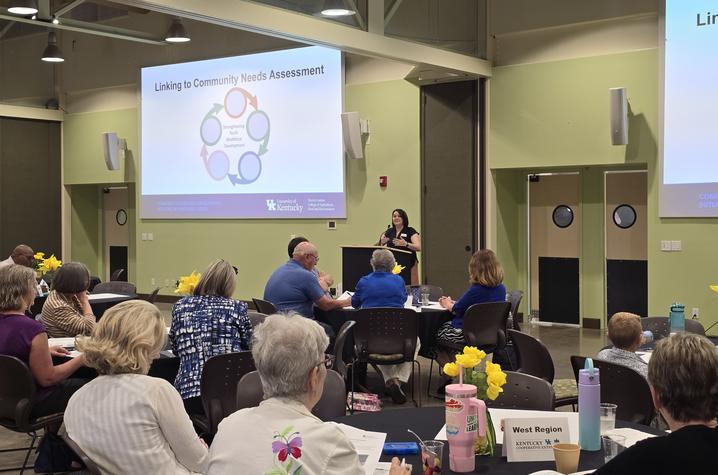‘Invaluable information’: UK Extension gathers Kentucky data, informs future programming
LEXINGTON, Ky. (Aug. 9, 2024) — The University of Kentucky Cooperative Extension is releasing data gathered from its Statewide Community Needs Assessment survey, offering valuable insights to help communities across the Commonwealth.
The survey was conducted to identify and prioritize community needs, issues and opportunities that UK Extension can address through education and engagement. The results are now available on a public dashboard.
“The community assessment is an important tool that helps us shape educational programming and ensure we are meeting the needs of communities across the state,” said Laura Stephenson, associate dean for extension at UK Martin-Gatton College of Agriculture, Food and Environment. “We are so grateful for the enthusiastic participation in the survey and are happy to share the results.”
Collecting the data
The survey’s questions were sorted into four areas: Agricultural and Natural Resources, Youth Development, Family and Individual Development, and Community and Economic Development. Within each area, respondents were asked to indicate the extent to which practical education and assistance are needed in their communities.
Respondents were also asked to report demographic characteristics and their familiarity with the cooperative extension service. The final question was open-ended, allowing respondents to identify additional needs that hadn’t been included in the survey.
Disseminated by UK and Kentucky State University personnel, the survey was available to any adult across Kentucky’s 120 counties. Conducted from August to December 2023, the survey received 35,830 responses.
“Our county agents were very exceptional in recruiting Kentuckians to participate in the survey,” said Lola Adedokun, assistant extension professor in the UK Department of Community and Leadership Development.
Organizing and contextualizing the data
On the dashboard, results are organized by the four focus areas, supplemented by categories such as “Who Responded” and “Top 15 Priority Issues.” Data can be viewed at a statewide level or filtered by county, age, income, education level, gender, employment and familiarity with UK Cooperative Extension.
“The advantage of having those filters is that we can then have data-driven programming that targets specific populations within our state,” Adedokun said.
To assist in using the survey results for local planning, the responses are further supplemented by secondary data, including from the Census Bureau. Drawing from 42 different sources, data were selected that related to issues covered in the survey. This information was compiled by Julie N. Zimmerman, Milton Coughenour Professor of Rural Sociology and extension applied demographer in the Martin-Gatton CAFE.
Zimmerman’s extension program, Kentucky: By The Numbers, provides resources, training and assistance in finding and using secondary data and includes a data series for all 120 counties in the state. Zimmerman led efforts to create four issues of Kentucky: By the Numbers that correspond to the survey’s four sections.
For nearly a year, Zimmerman said, she had her "head in Excel,” working on nearly 50,000 individual points of data.
Applying the data
“Doing something like the Extension Needs Assessment is a behemoth of a project to do,” Zimmerman said. “But done well and done right, it’s invaluable information that you just can’t get any other way, especially when it comes to information for rural areas. These are results from the citizens in their county. That’s a powerful voice and powerful information to have.”
When Harrison County Cooperative Extension agent Shelley Meyer switched from 4-H Youth Development to Family and Consumer Sciences in 2021, she conducted an interest survey to gauge county needs.
“Increased exercise opportunities was a popular response, which ignited increased programming efforts,” Meyer said, including walking challenges and yearly 5Ks.
Responses to the 2023 Community Needs Assessment indicated the programming was working, as people in Harrison County reported an improvement in physical activity opportunities. Continued programming will maintain those opportunities, Meyer said.
“Extension agents benefit from the results, as they receive a community perspective on what programs are existing and effective, as well as what areas could improve with more educational resources,” she said.
Adedokun said the survey results are “eye-opening” for extension personnel. One interesting result, she noted, is that nearly 70% of respondents were either not familiar or only somewhat familiar with Cooperative Extension.
“That gives us the opportunity to expand and to reach more people across Kentucky,” she said.
Results inform UK Extension’s Plan of Work, a local process used to guide extension efforts in each county over the next five years. Agents gather with their advisory councils to decide on key needs and issues, focusing on solving problems within their communities. An updated Plan of Work will be available in 2025.
After reviewing the assessment results, three priority areas were identified:
- Strengthening Kentucky’s farms, food systems and natural resources through innovative research, education and collaboration to improve profitability and sustainability.
- Building the health and well-being of Kentuckians — physically, mentally and economically — to improve quality of life and ensure bright futures for all.
- Engaging communities for vibrant economies by connecting businesses, environments and people.
These three areas highlight the system-wide approach that extension employs — using research to inform educational programming and bringing resources to counties.
View the Community Assessment dashboard at https://extension.ca.uky.edu/community-assessment.
View the secondary data at https://kybtn.ca.uky.edu/data-series/secondary-data-statewide-community-needs-assessment.
Learn more about your county extension office at https://extension.ca.uky.edu/county.


As the state’s flagship, land-grant institution, the University of Kentucky exists to advance the Commonwealth. We do that by preparing the next generation of leaders — placing students at the heart of everything we do — and transforming the lives of Kentuckians through education, research and creative work, service and health care. We pride ourselves on being a catalyst for breakthroughs and a force for healing, a place where ingenuity unfolds. It's all made possible by our people — visionaries, disruptors and pioneers — who make up 200 academic programs, a $476.5 million research and development enterprise and a world-class medical center, all on one campus.




